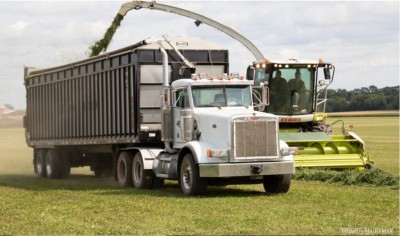Field Equipment or Road Equipment?

By Joe Lawrence: PRO-DAIRY
The impacts of soil compaction have long been known, with many interacting effects related to water infiltration, root growth, nutrient availability, and more limiting crop productivity.
While reducing the weight trafficking through fields has been a long-standing tenant of compaction management, on dairy farms, heavy loads of manure and forages are unavoidable. Advances in manure management related to manure transfer and drag line field application are substantial wins in this area. Even when tanker spreaders are still used in the field, filling from a temporary tank (frac tank) instead of having to travel back and forth to the storage to reload is an improvement. It is useful to remember we can still do damage to our soils with manure injection equipment when applications are made to wet soils.
Getting forages out of the field, on the other hand, presents different challenges than liquid manure.
You can't have it both ways
An important area to look at in any discussion on soil compaction is tires (and tire inflation); however, proper tire setup is really a moot point when we have forage transfer equipment operating in the fields and on the roads. You just can't have the proper tires for both. Recent mobile tire inflation options are a significant investment and only address one aspect (tire pressure) of the numerous challenges (such as tire style, soil impacts, and road and infrastructure impacts) associated with using the same tires and equipment in field and road settings.
Furthermore, using the same equipment for both field and road applications brings added cost and risk. The abuse of driving road equipment through the field adds to operations and maintenance cost. It is inevitable that equipment leaving fields is going to bring dust and mud onto the roads at one point or another, creating road infrastructure and public safety challenges.
This all points to the need to keep field equipment in the field and road equipment on the road. It is a discussion that is slowly picking up momentum, but needs more attention, and to be expanded beyond manure management.
When approaching this subject with forages, dump carts in the field (with proper tire setup) transferring their loads into road equipment at the field's edge is an obvious direction to explore. This idea often receives pushback with the perception that it will slow operations and that it is really only necessary if field conditions are so muddy during harvest you cannot get trucks into the fields.
In reality, the discussion and cost benefit analysis need to go much further than these points.
Road tires in the field are doing damage to the soil, adding to the hidden losses associated with compaction, even when field conditions are perceived as "okay."
Even when following best practices for soil management and fine-tuning crop rotations (such as by noting crop maturities to facilitate timely planting and harvest), mud is inevitable, particularly with the more frequent extreme weather events many areas are experiencing. Additionally, the associated costs are more substantial than most acknowledge. Labor and equipment resources dedicated to harvesting in challenging field conditions, such as pulling tractors and road cleaners, can offset the added labor and equipment needed to run dump carts. Operation and maintenance costs for all equipment are higher when they are used in the wrong setting.
Considerations for the community also need to be factored in, not only with road safety but with the impacts of road damage on business relationships with municipalities.
As farms continue to evolve, truly addressing soil management in forage production requires more focus, with the distinction between field equipment and road equipment being an important opportunity.
Upcoming Events
Boots in the Barn: Cornell Dairy Research Updates
January 13, 2026
January 20, 2026
January 27, 2026
February 3, 2026
February 10, 2026
February 17, 2026
February 24, 2026
Join us for some or all!
Webinar: Converting Old Dairy Barns into swine Facilities
January 21, 2026 : Webinar: Converting Old Dairy Barns into swine Facilities
Tim Terry, Farm Strategic Planning Specialist with Cornell's Pro-Dairy program will share information on what it takes to transition an old dairy barn for swine production. We plan to cover flooring, ventilation, and lighting, considerations for system workability, and more! Registration is free.
Southern Tier Crop Congress
January 28, 2026 : Southern Tier Crop Congress
Belfast, NY
Join SWNYDLFC and CCE Allegany County for the upcoming Southern Tier Crop Congress. CCA and DEC credits are available!
Announcements
Cows, Crops & Critters Newsletter Sponsorship
TRYING TO REACH GROWERS AND AGRIBUSINESSES IN OUR SOUTHWEST REGION OF NEW YORK?Weekly Email Update: Shared with 625+ households who have signed up with our program.
Monthly Paper Mailer: To reach our stakeholders and farmers who lack internet access, we send out a monthly mailer where your company's logo and contact information would be featured with a mailing list of 330+ households.
If you sponsor our weekly and monthly publications you reach approximately 955 households.





